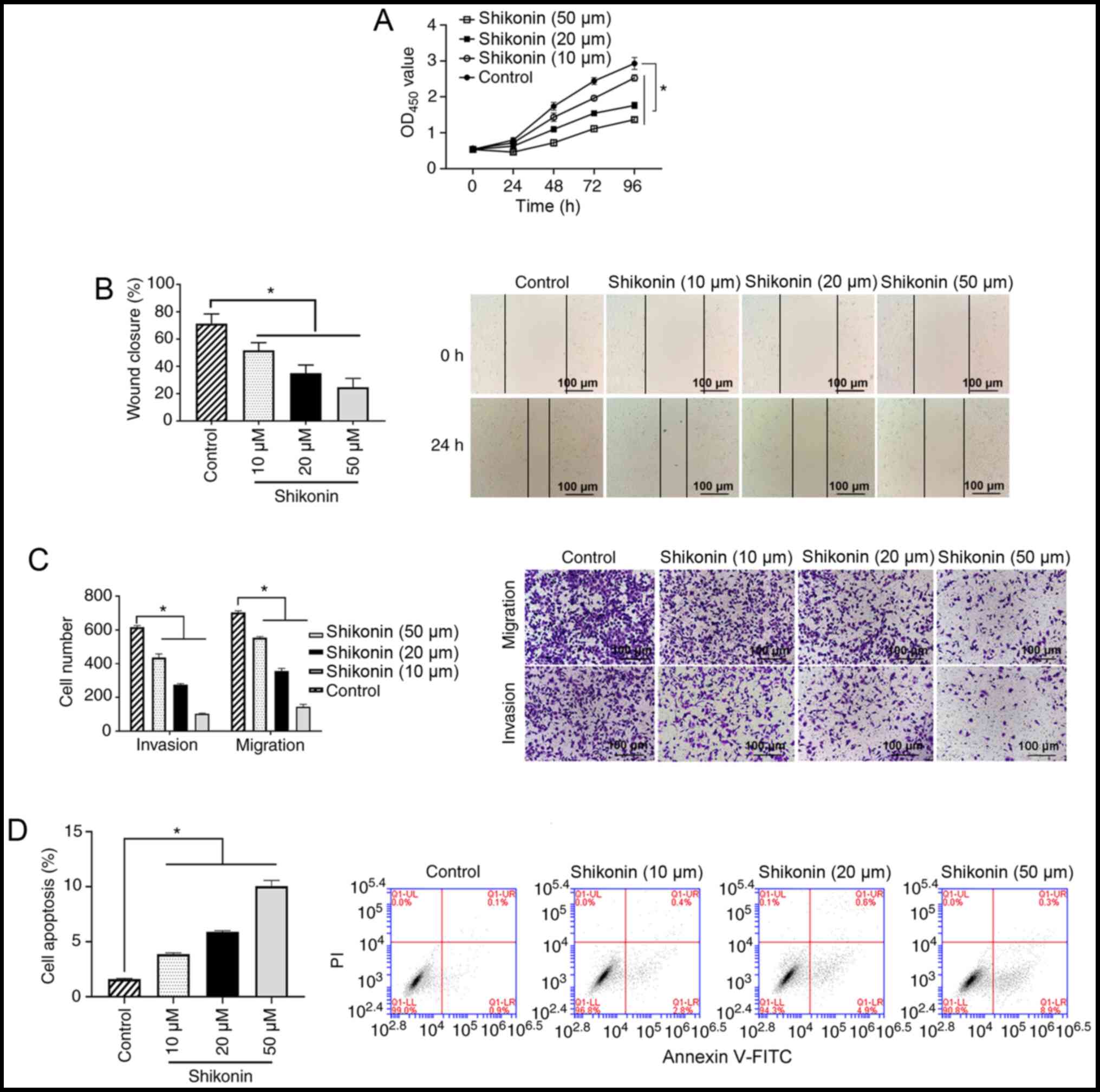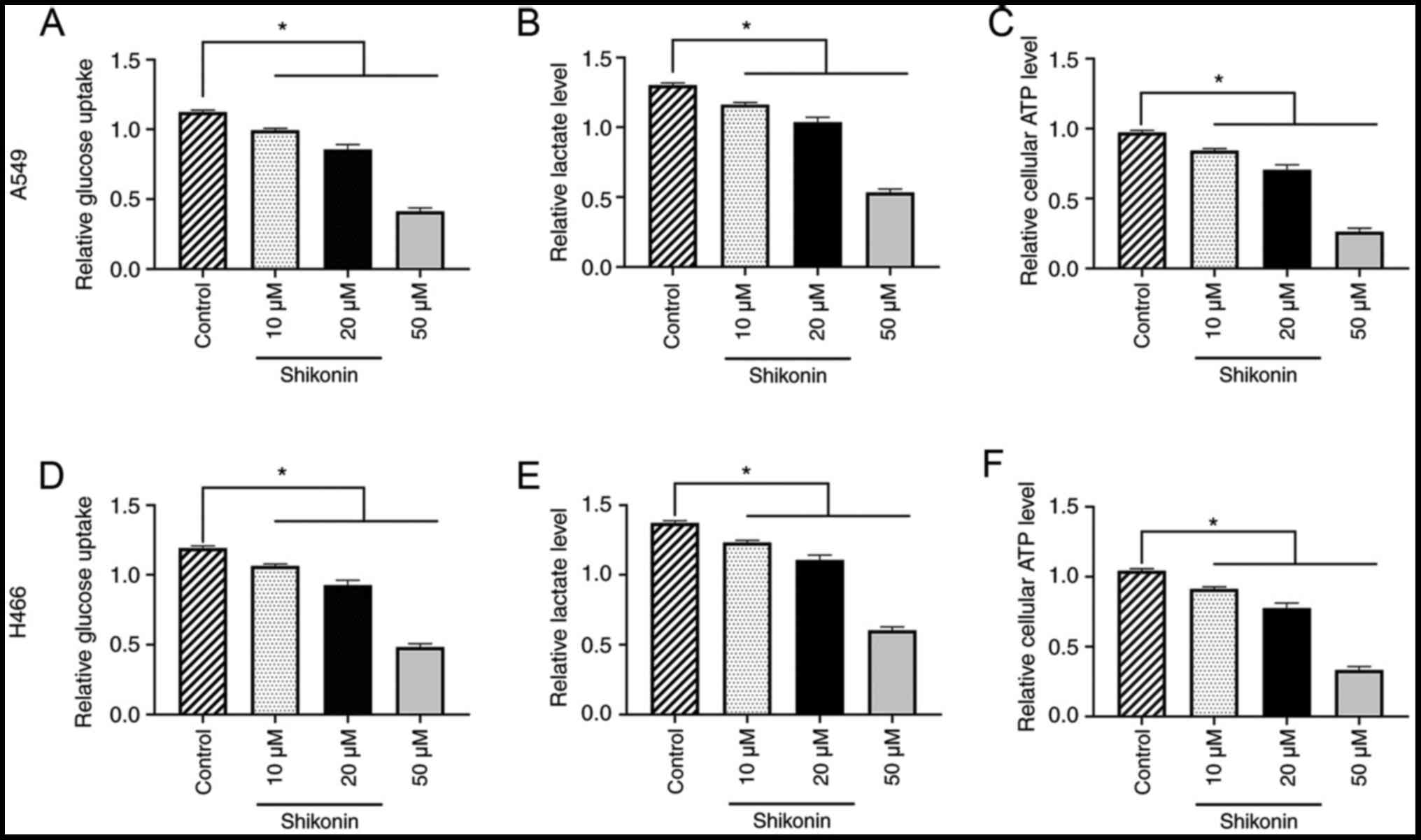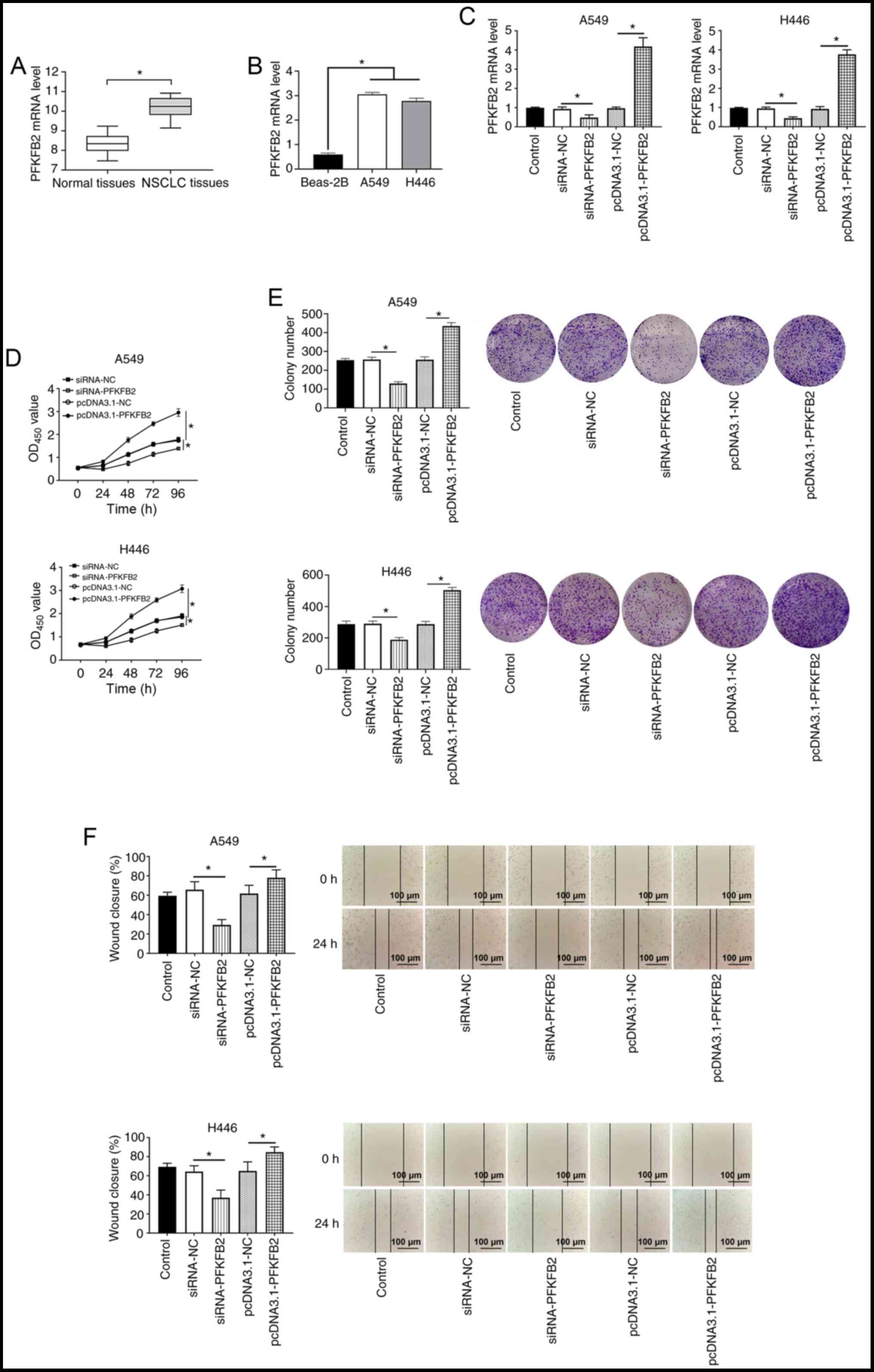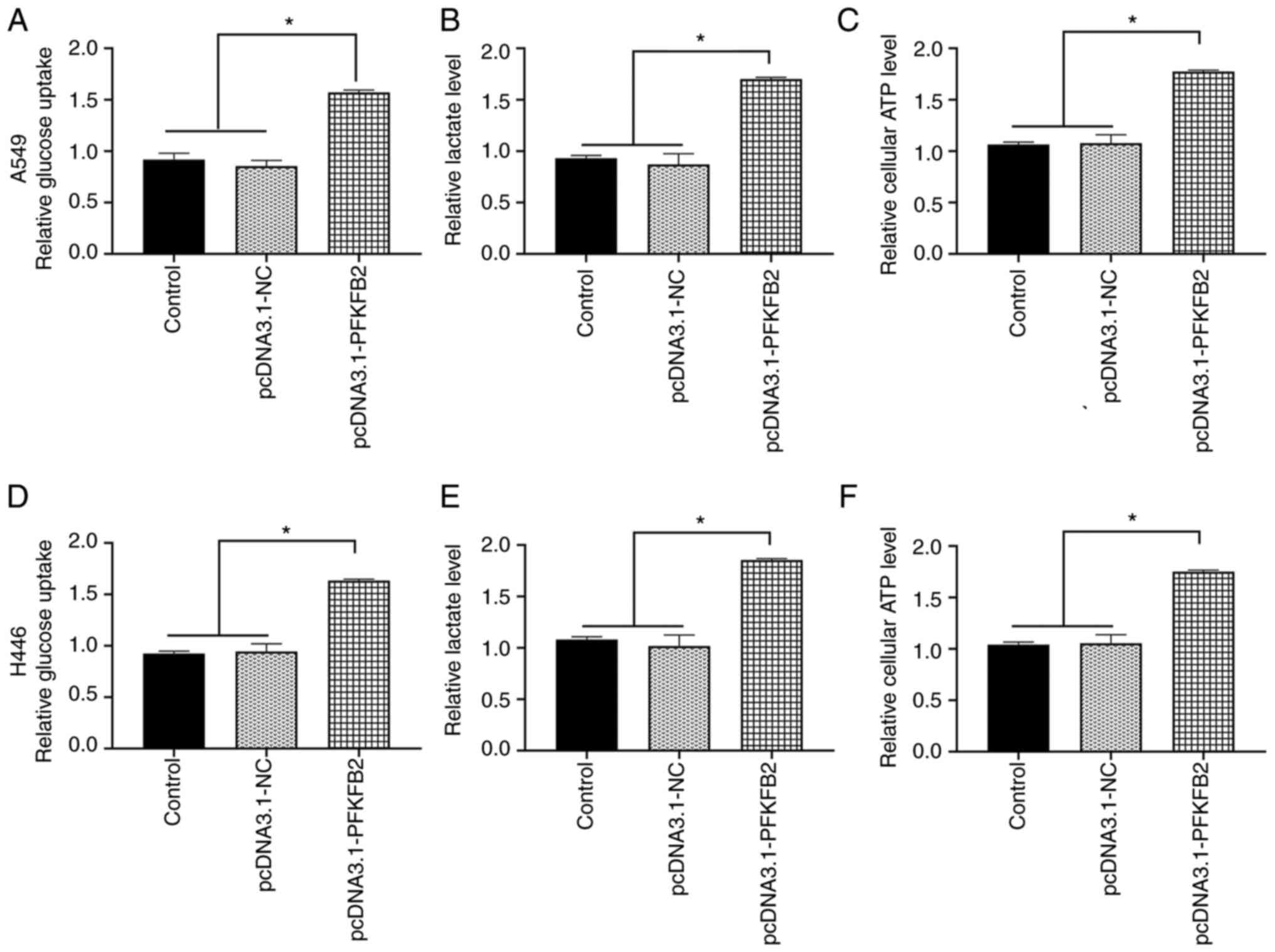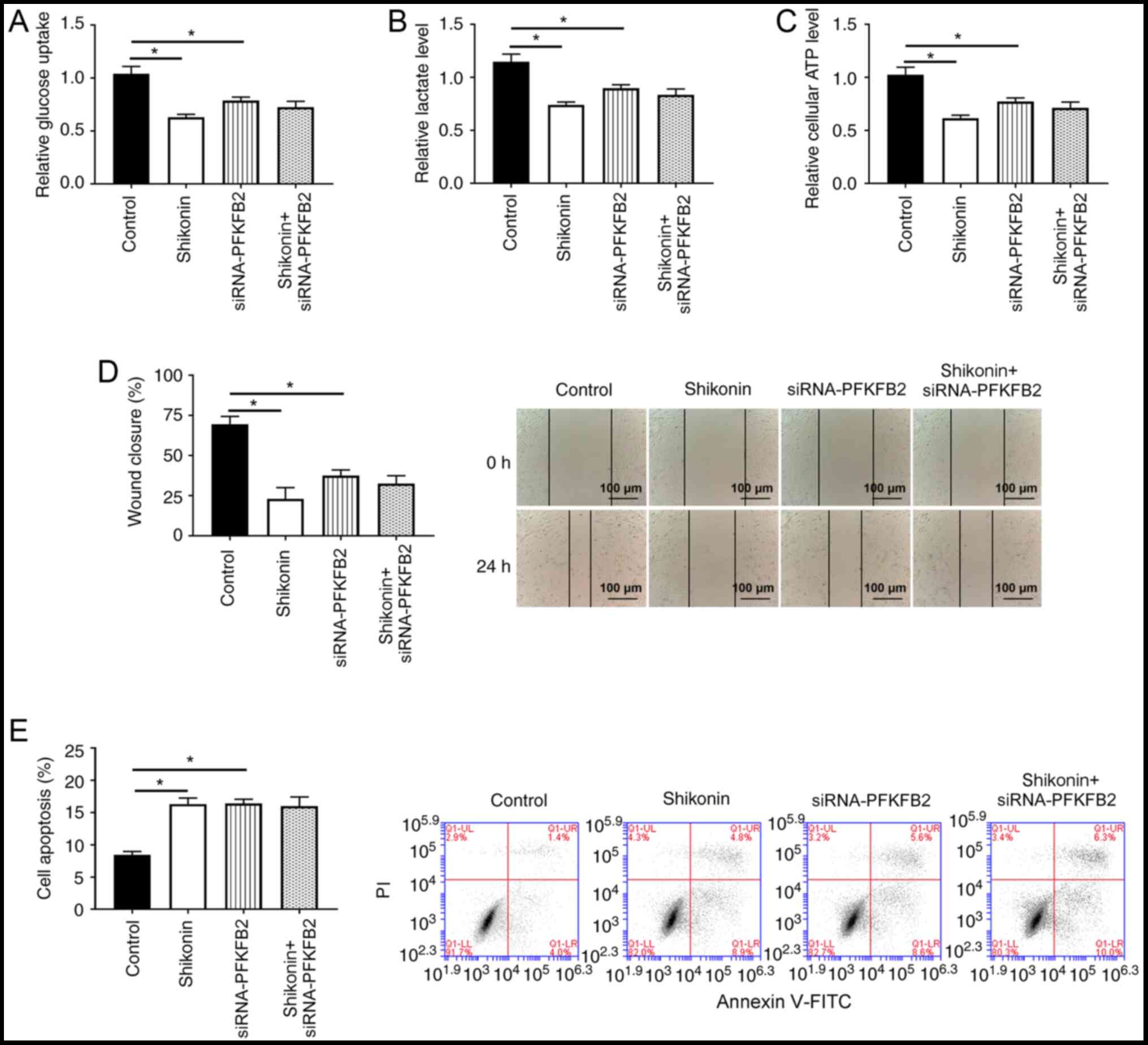|
1
|
Bray F, Ferlay J, Soerjomataram I, Siegel
RL, Torre LA and Jemal A: Global cancer statistics 2018: GLOBOCAN
estimates of incidence and mortality worldwide for 36 cancers in
185 countries. CA Cancer J Clin. 68:394–424. 2018. View Article : Google Scholar : PubMed/NCBI
|
|
2
|
Blandin Knight S, Crosbie PA, Balata H,
Chudziak J, Hussell T and Dive C: Progress and prospects of early
detection in lung cancer. Open Biol. 7:1700702017. View Article : Google Scholar : PubMed/NCBI
|
|
3
|
Rossi A, Tay R, Chiramel J, Prelaj A and
Califano R: Current and future therapeutic approaches for the
treatment of small cell lung cancer. Expert Rev Anticancer Ther.
18:473–486. 2018. View Article : Google Scholar : PubMed/NCBI
|
|
4
|
King-Kallimanis BL, Kanapuru B, Blumenthal
GM, Theoret MR and Kluetz PG: Age-related differences in
patient-reported outcomes in patients with advanced lung cancer
receiving anti-PD-1/PD-L1 therapy. Semin Oncol. 45:201–209. 2018.
View Article : Google Scholar : PubMed/NCBI
|
|
5
|
Shukuya T and Carbone DP: Predictive
markers for the efficacy of anti-PD-1/PD-L1 antibodies in lung
cancer. J Thorac Oncol. 11:976–988. 2016. View Article : Google Scholar : PubMed/NCBI
|
|
6
|
Festino L, Botti G, Lorigan P, Masucci GV,
Hipp JD, Horak CE, Melero I and Ascierto PA: Cancer treatment with
Anti-PD-1/PD-L1 agents: Is PD-L1 expression a biomarker for patient
selection? Drugs. 76:925–945. 2016. View Article : Google Scholar : PubMed/NCBI
|
|
7
|
Zhong W, Chen S, Qin Y, Zhang H, Wang H,
Meng J, Huai L, Zhang Q, Yin T, Lei Y, et al: Doxycycline inhibits
breast cancer EMT and metastasis through
PAR-1/NF-κB/miR-17/E-cadherin pathway. Oncotarget. 8:104855–104866.
2017. View Article : Google Scholar : PubMed/NCBI
|
|
8
|
Zhong W, Chen S, Zhang Q, Xiao T, Qin Y,
Gu J, Sun B, Liu Y, Jing X, Hu X, et al: Doxycycline directly
targets PAR1 to suppress tumor progression. Oncotarget.
8:16829–16842. 2017. View Article : Google Scholar : PubMed/NCBI
|
|
9
|
Liberti MV and Locasale JW: The Warburg
effect: How does it benefit cancer cells? Trends Biochem Sci.
41:211–218. 2016. View Article : Google Scholar : PubMed/NCBI
|
|
10
|
Bi YH, Han WQ, Li RF, Wang YJ, Du ZS, Wang
XJ and Jiang Y: Signal transducer and activator of transcription 3
promotes the Warburg effect possibly by inducing pyruvate kinase M2
phosphorylation in liver precancerous lesions. World J
Gastroenterol. 25:1936–1949. 2019. View Article : Google Scholar : PubMed/NCBI
|
|
11
|
Luo Y, Medina Bengtsson L, Wang X, Huang
T, Liu G, Murphy S, Wang C, Koren J III, Schafer Z and Lu X: UQCRH
downregulation promotes Warburg effect in renal cell carcinoma
cells. Sci Rep. 10:150212020. View Article : Google Scholar : PubMed/NCBI
|
|
12
|
Martinez-Outschoorn UE, Lin Z, Trimmer C,
Flomenberg N, Wang C, Pavlides S, Pestell RG, Howell A, Sotgia F
and Lisanti MP: Cancer cells metabolically ‘fertilize’ the tumor
microenvironment with hydrogen peroxide, driving the Warburg
effect: Implications for PET imaging of human tumors. Cell Cycle.
10:2504–2520. 2011. View Article : Google Scholar : PubMed/NCBI
|
|
13
|
Gregory CD and Paterson M: An
apoptosis-driven ‘onco-regenerative niche’: Roles of
tumour-associated macrophages and extracellular vesicles. Philos
Trans R Soc Lond B Biol Sci. 373:201700032018. View Article : Google Scholar : PubMed/NCBI
|
|
14
|
Chen Z, Zuo X, Yao Z, Han G, Zhang L, Wu J
and Wang X: MiR-3662 suppresses hepatocellular carcinoma growth
through inhibition of HIF-1α-mediated Warburg effect. Cell Death
Dis. 9:5492018. View Article : Google Scholar : PubMed/NCBI
|
|
15
|
Wang S, Zhang Y, Cai Q, Ma M, Jin LY, Weng
M, Zhou D, Tang Z, Wang JD and Quan Z: Circular RNA FOXP1 promotes
tumor progression and Warburg effect in gallbladder cancer by
regulating PKLR expression. Mol Cancer. 18:1452019. View Article : Google Scholar : PubMed/NCBI
|
|
16
|
Li J, Zhang J, Xie F, Peng J and Wu X:
Macrophage migration inhibitory factor promotes Warburg effect via
activation of the NF-κB/HIF-1α pathway in lung cancer. Int J Mol
Med. 41:1062–1068. 2018.PubMed/NCBI
|
|
17
|
Lu J, Tan M and Cai Q: The Warburg effect
in tumor progression: Mitochondrial oxidative metabolism as an
anti-metastasis mechanism. Cancer Lett. 356:156–164. 2015.
View Article : Google Scholar : PubMed/NCBI
|
|
18
|
Feng Y, Liu J, Guo W, Guan Y, Xu H, Guo Q,
Song X, Yi F, Liu T, Zhang W, et al: Atg7 inhibits Warburg effect
by suppressing PKM2 phosphorylation resulting reduced
epithelial-mesenchymal transition. Int J Biol Sci. 14:775–783.
2018. View Article : Google Scholar : PubMed/NCBI
|
|
19
|
Xu L, Li Y, Zhou L, Dorfman RG, Liu L, Cai
R, Jiang C, Tang D, Wang Y, Zou X, et al: SIRT3 elicited an
anti-Warburg effect through HIF1α/PDK1/PDHA1 to inhibit
cholangiocarcinoma tumorigenesis. Cancer Med. 8:2380–2391. 2019.
View Article : Google Scholar : PubMed/NCBI
|
|
20
|
Zhu W, Huang Y, Pan Q, Xiang P, Xie N and
Yu H: MicroRNA-98 suppress Warburg effect by targeting HK2 in colon
cancer cells. Dig Dis Sci. 62:660–668. 2017. View Article : Google Scholar : PubMed/NCBI
|
|
21
|
Khan MA, Zubair H, Anand S, Srivastava SK,
Singh S and Singh AP: Dysregulation of metabolic enzymes in tumor
and stromal cells: Role in oncogenesis and therapeutic
opportunities. Cancer Lett. 473:176–185. 2020. View Article : Google Scholar : PubMed/NCBI
|
|
22
|
Ozcan SC, Sarioglu A, Altunok TH, Akkoc A,
Guzel S, Guler S, Imbert-Fernandez Y, Muchut RJ, Iglesias AA,
Gurpinar Y, et al: PFKFB2 regulates glycolysis and proliferation in
pancreatic cancer cells. Mol Cell Biochem. 470:115–129. 2020.
View Article : Google Scholar : PubMed/NCBI
|
|
23
|
Yang H, Shu Z, Jiang Y, Mao W, Pang L,
Redwood A, Jeter-Jones SL, Jennings NB, Ornelas A, Zhou J, et al:
6-Phosphofructo-2-kinase/fructose-2,6-biphosphatase-2 regulates
TP53-dependent paclitaxel sensitivity in ovarian and breast
cancers. Clin Cancer Res. 25:5702–5716. 2019. View Article : Google Scholar : PubMed/NCBI
|
|
24
|
Pape MR, Prokop C and Hedrich HJ:
Localization of the Pfkfb 2 gene on rat Chromosome 13. Mamm Genome.
7:5591996. View Article : Google Scholar : PubMed/NCBI
|
|
25
|
Novellasdemunt L, Tato I, Navarro-Sabate
A, Ruiz-Meana M, Méndez-Lucas A, Perales JC, Garcia-Dorado D,
Ventura F, Bartrons R and Rosa JL: Akt-dependent activation of the
heart 6-phosphofructo-2-kinase/fructose-2,6-bisphosphatase (PFKFB2)
isoenzyme by amino acids. J Biol Chem. 288:10640–10651. 2013.
View Article : Google Scholar : PubMed/NCBI
|
|
26
|
Jeung YJ, Kim HG, Ahn J, Lee HJ, Lee SB,
Won M, Jung CR, Im JY, Kim BK, Park SK, et al: Shikonin induces
apoptosis of lung cancer cells via activation of FOXO3a/EGR1/SIRT1
signaling antagonized by p300. Biochim Biophys Acta.
1863:2584–2593. 2016. View Article : Google Scholar : PubMed/NCBI
|
|
27
|
Livak KJ and Schmittgen TD: Analysis of
relative gene expression data using real-time quantitative PCR and
the 2(-Delta Delta C(T)) method. Methods. 25:402–408. 2001.
View Article : Google Scholar : PubMed/NCBI
|
|
28
|
Barta JA, Powell CA and Wisnivesky JP:
Global epidemiology of lung cancer. Ann Glob Health. 85:82019.
View Article : Google Scholar : PubMed/NCBI
|
|
29
|
Li L, Wang S, Yang X, Long S, Xiao S, Wu W
and Hann SS: Traditional Chinese medicine, Fuzheng Kang-Ai
decoction, inhibits metastasis of lung cancer cells through the
STAT3/MMP9 pathway. Mol Med Rep. 16:2461–2468. 2017. View Article : Google Scholar : PubMed/NCBI
|
|
30
|
Liao YH, Li CI, Lin CC, Lin JG, Chiang JH
and Li TC: Traditional Chinese medicine as adjunctive therapy
improves the long-term survival of lung cancer patients. J Cancer
Res Clin Oncol. 143:2425–2435. 2017. View Article : Google Scholar : PubMed/NCBI
|
|
31
|
Yang J, Zhu X, Yuan P, Liu J, Wang B and
Wang G: Efficacy of traditional Chinese medicine combined with
chemotherapy in patients with non-small cell lung cancer (NSCLC): A
meta-analysis of randomized clinical trials. Support Care Cancer.
28:3571–3579. 2020. View Article : Google Scholar : PubMed/NCBI
|
|
32
|
Andújar I, Ríos JL, Giner RM and Recio MC:
Pharmacological properties of shikonin-a review of literature since
2002. Planta Med. 79:1685–1697. 2013. View Article : Google Scholar
|
|
33
|
Wang F, Yao X, Zhang Y and Tang J:
Synthesis, biological function and evaluation of shikonin in cancer
therapy. Fitoterapia. 134:329–339. 2019. View Article : Google Scholar : PubMed/NCBI
|
|
34
|
Wei PL, Tu CC, Chen CH, Ho YS, Wu CT, Su
HY, Chen WY, Liu JJ and Chang YJ: Shikonin suppresses the migratory
ability of hepatocellular carcinoma cells. J Agric Food Chem.
61:8191–8197. 2013. View Article : Google Scholar : PubMed/NCBI
|
|
35
|
Guo XP, Zhang XY and Zhang SD: Clinical
trial on the effects of shikonin mixture on later stage lung
cancer. Zhong Xi Yi Jie He Za Zhi. 11:598–599, 580. 1991.(In
Chinese). PubMed/NCBI
|
|
36
|
Zhang Y, Sun B, Huang Z, Zhao DW and Zeng
Q: Shikonin inhibites migration and invasion of thyroid cancer
cells by downregulating DNMT1. Med Sci Monit. 24:661–670. 2018.
View Article : Google Scholar : PubMed/NCBI
|
|
37
|
Guo N, Miao R, Gao X, Huang D, Hu Z, Ji N,
Nan Y, Jiang F and Gou X: Shikonin inhibits proliferation and
induces apoptosis in glioma cells via downregulation of CD147. Mol
Med Rep. 19:4335–4343. 2019.PubMed/NCBI
|
|
38
|
Wang W, Wu Y, Chen S, Liu X, He J, Wang S,
Lu W, Tang Y and Huang J: Shikonin is a novel and selective IMPDH2
inhibitor that target triple-negative breast cancer. Phytother Res.
35:463–476. 2021. View Article : Google Scholar : PubMed/NCBI
|
|
39
|
Yu Z, Huang L, Qiao P, Jiang A, Wang L,
Yang T, Tang S, Zhang W and Ren C: PKM2 Thr454 phosphorylation
increases its nuclear translocation and promotes xenograft tumor
growth in A549 human lung cancer cells. Biochem Biophys Res Commun.
473:953–958. 2016. View Article : Google Scholar : PubMed/NCBI
|
|
40
|
Rong F, Tian X, Fang Z, Sun Y, Li F, Gao
Y, Feng Y, Li L, Wang Y, Liu X, et al: MicroRNA-143 (miR-143)
regulates cancer glycolysis via targeting hexokinase 2 gene. J Biol
Chem. 287:23227–23235. 2012. View Article : Google Scholar : PubMed/NCBI
|
|
41
|
DeBerardinis RJ, Lum JJ, Hatzivassiliou G
and Thompson CB: The biology of cancer: Metabolic reprogramming
fuels cell growth and proliferation. Cell Metab. 7:11–20. 2008.
View Article : Google Scholar : PubMed/NCBI
|
|
42
|
Schild T, Low V, Blenis J and Gomes AP:
Unique metabolic adaptations dictate distal organ-specific
metastatic colonization. Cancer Cell. 33:347–354. 2018. View Article : Google Scholar : PubMed/NCBI
|
|
43
|
Shamsi M, Saghafian M, Dejam M and
Sanati-Nezhad A: Mathematical modeling of the function of Warburg
effect in tumor microenvironment. Sci Rep. 8:89032018. View Article : Google Scholar : PubMed/NCBI
|
|
44
|
Hussain A, Qazi AK, Mupparapu N, Guru SK,
Kumar A, Sharma PR, Singh SK, Singh P, Dar MJ, Bharate SB, et al:
Modulation of glycolysis and lipogenesis by novel PI3K selective
molecule represses tumor angiogenesis and decreases colorectal
cancer growth. Cancer Lett. 374:250–260. 2016. View Article : Google Scholar : PubMed/NCBI
|
|
45
|
Yalcin A, Telang S, Clem B and Chesney J:
Regulation of glucose metabolism by
6-phosphofructo-2-kinase/fructose-2,6-bisphosphatases in cancer.
Exp Mol Pathol. 86:174–179. 2009. View Article : Google Scholar : PubMed/NCBI
|
|
46
|
Minchenko OH, Ogura T, Opentanova IL,
Minchenko DO, Ochiai A, Caro J, Komisarenko SV and Esumi H:
6-Phosphofructo-2-kinase/fructose-2,6-bisphosphatase gene family
overexpression in human lung tumor. Ukr Biokhim Zh. 77:46–50.
1999.PubMed/NCBI
|
|
47
|
Minchenko OH, Tsuchihara K, Minchenko DO,
Bikfalvi A and Esumi H: Mechanisms of regulation of PFKFB
expression in pancreatic and gastric cancer cells. World J
Gastroenterol. 20:13705–13717. 2014. View Article : Google Scholar : PubMed/NCBI
|
|
48
|
Houles T, Gravel SP, Lavoie G, Shin S,
Savall M, Méant A, Grondin B, Gaboury L, Yoon SO, St-Pierre J and
Roux PP: RSK regulates PFK-2 activity to promote metabolic rewiring
in melanoma. Cancer Res. 78:2191–2204. 2018. View Article : Google Scholar : PubMed/NCBI
|
|
49
|
Zhao SJ, Shen YF, Li Q, He YJ, Zhang YK,
Hu LP, Jiang YQ, Xu NW, Wang YJ, Li J, et al: SLIT2/ROBO1 axis
contributes to the Warburg effect in osteosarcoma through
activation of SRC/ERK/c-MYC/PFKFB2 pathway. Cell Death Dis.
9:3902018. View Article : Google Scholar : PubMed/NCBI
|
|
50
|
Camargo Barros-Filho M, Barreto Menezes de
Lima L, Bisarro Dos Reis M, Bette Homem de Mello J, Moraes Beltrami
C, Lopes Pinto CA, Kowalski LP and Rogatto SR: PFKFB2 promoter
hypomethylation as recurrence predictive marker in
well-differentiated thyroid carcinomas. Int J Mol Sci. 20:13342019.
View Article : Google Scholar : PubMed/NCBI
|
|
51
|
Liu H, Chen K, Wang L, Zeng X, Huang Z, Li
M, Dong P and Chen X: miR-613 inhibits Warburg effect in gastric
cancer by targeting PFKFB2. Biochem Biophys Res Commun. 515:37–43.
2019. View Article : Google Scholar : PubMed/NCBI
|
|
52
|
Liberti MV, Allen AE, Ramesh V, Dai Z,
Singleton KR, Guo Z, Liu JO, Wood KC and Locasale JW: Evolved
resistance to partial GAPDH inhibition results in loss of the
Warburg effect and in a different state of glycolysis. J Biol Chem.
295:111–124. 2020. View Article : Google Scholar : PubMed/NCBI
|















